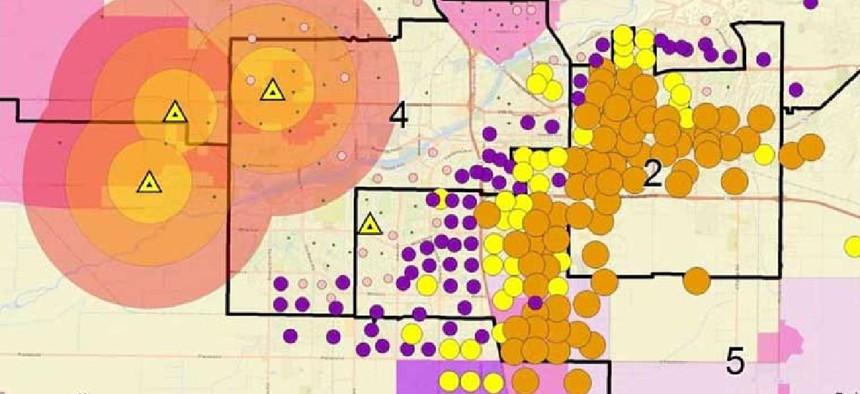To address racial inequity, many leaders are starting with a map

GIS helps policymakers visualize inequality and identify where community needs are greatest, prodding society to more equitable outcomes.
People and organizations often tell stories using maps. Many use the technology of a geographic information system to gather and store crucial mappable data, process it and, most importantly, display the information in a way that can be easily understood. Sometimes the result is an actual story map, but often GIS produces maps and dashboards that allow stories to emerge from the visuals. The data reflects real people and the way community conditions affect their lived experiences. The maps are therefore useful ways to distill many individual stories into one (or more) overarching narrative.
Those GIS maps and stories arise through workflows that can help organizations -- government, business and nonprofits -- map racial inequities in a way that promotes actions to mitigate them. The following workflows are general recommendations. Each complements the others, and adapting and combining them produces the most powerful results.
Engage communities
GIS can be an especially powerful tool for engaging a community because of its ability to promote and share maps and information. Web and mobile mapping apps act as virtual meeting places and common ground. They provide a kind of “ground truth,” a common canvas for displaying data so that all stakeholders can approach a problem on the same terms.
In Oakland, Calif., the city’s Department of Race and Equity studied 72 different indicators of well-being, breaking down data about outcomes and community conditions by race and analyzing it in the context of housing, health care and other concerns. On its own, as charts, graphs and tables, the data was powerful and informative, but projecting it onto a map brought inequities to light. When circulated through communities, the map helped people understand the long-term urban effects of structural racism. Just as important, it helped spur solutions.
When the city’s Department of Transportation collaborated with the Race and Equity office on an equity-focused road paving plan, maps helped determine which streets to include. Travel data, projected onto a map, provided clear evidence for why improving roads in communities of color would positively impact the lives of more Oakland residents. The map was a way to argue for equitable distribution of resources. It helped mitigate the advantage that areas of power and privilege have in decisions regarding civic projects.
Map and analyze data
The paving project, and the way GIS helped Oakland communities grasp the logic behind it, illustrated the value of another GIS workflow. With the right local and historical data, the combination of maps and analysis can produce powerful results.
In Philadelphia and Florida’s Palm Beach County -- which both have large countywide school districts -- COVID-19 forced education officials to determine how best to bridge a digital divide that reflected racial disparities. Even before the pandemic, research revealed a growing “homework gap.” More than one in five Black teens are forced to search out public Wi-Fi sources for connectivity, and Hispanic teens are twice as likely as their white counterparts to report lack of access to a home computer. With school closures, it was imperative that all students have access to computers and high-speed internet.
Mapping school and demographic data helped both school districts identify clusters where communities were likely in need and distribute resources accordingly. The same maps helped determine where and how to assemble, with necessary haste, broadband networks.
Operationalize racial justice best practices
The connection between mapping and analysis helped these school districts achieve a third crucial workflow, the ability to operationalize racial justice best practices. GIS can help ensure that goods and services are allocated fairly, with an eye toward racial equity.
In California’s Kern County, maps helped activists and organizers fight for school board representation that accurately reflected the county’s large Latino population. The key was a map (featured above) that showed how much current redistricting practices misrepresented this community.
The map served two purposes. It condensed large amounts of data regarding the ethnic distribution of Kern County -- and the way some neighborhoods were underrepresented in school board decisions -- into an intuitive format. It was also demonstrated how urgently change was needed for the kind of political representation that typically receives little attention and it offered a way to rally the community behind the struggle.
The activists used GIS to engage communities, analyze the problem and fight for fairer allocation of political resources, three workflows working in harmony toward a shared goal.
Manage performance
Another GIS-related equity workflow involves using the technology to manage performance of initiatives and services to understand impact through an equity lens. This workflow leverages GIS to hold institutions accountable.
During the pandemic, for example, COVID-19 dashboards used GIS to visualize the spread of the disease. The Department of Health in Wisconsin’s Milwaukee County was one of the first to break down case and mortality data by race, gender, age and location within the county. The department’s COVID-19 dashboard showed how much the pandemic amplified pre-existing racial inequities, disproportionately burdening communities of color. Equity indicators built into the dashboard helped Milwaukee officials understand where the needs were greatest, make decisions accordingly and monitor efficacy.
This workflow, especially when conducted in conjunction with the others, shows how GIS can be a tool to bear witness. The struggle for racial equity is ongoing. It can’t always be broken down into data. Lived experience and stories of everyday people must be at the forefront. GIS helps policymakers conceptualize the struggle and identify where community needs are greatest, prodding society to more equitable outcomes.





